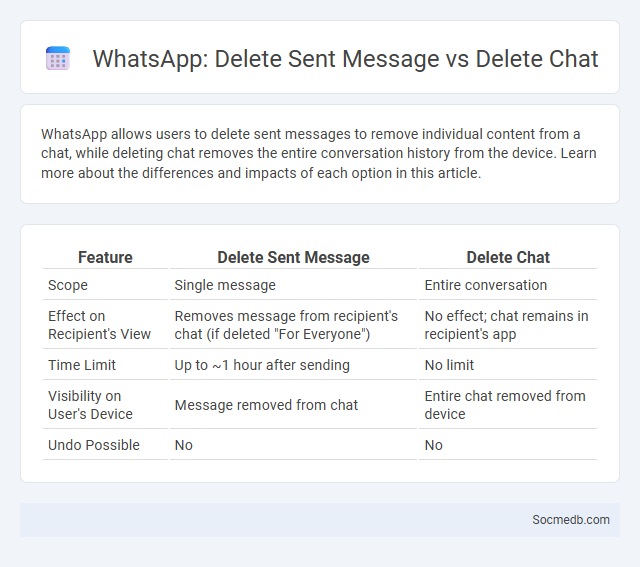
Photo illustration: WhatsApp Delete sent message vs Delete chat
WhatsApp allows users to delete sent messages to remove individual content from a chat, while deleting chat removes the entire conversation history from the device. Learn more about the differences and impacts of each option in this article.
Table of Comparison
| Feature | Delete Sent Message | Delete Chat |
|---|---|---|
| Scope | Single message | Entire conversation |
| Effect on Recipient's View | Removes message from recipient's chat (if deleted "For Everyone") | No effect; chat remains in recipient's app |
| Time Limit | Up to ~1 hour after sending | No limit |
| Visibility on User's Device | Message removed from chat | Entire chat removed from device |
| Undo Possible | No | No |
Understanding WhatsApp’s Message Management Features
WhatsApp's message management features include tools like message deletion, message forwarding limits, and archived chats to streamline your communication experience. You can delete messages for everyone within a specific timeframe, control how many times a message is forwarded to reduce misinformation, and archive chats to keep your inbox organized. These features help maintain privacy and enhance the efficiency of managing your conversations on the platform.
What Does “Delete Sent Message” Mean on WhatsApp?
Delete Sent Message" on WhatsApp allows you to remove a message you've sent from both your chat and the recipient's chat, ensuring privacy and control over your conversations. This feature is especially useful when you send a message by mistake or want to retract information before it's seen. You can delete messages within a limited time frame, enhancing your ability to manage your communication effectively.
How “Delete Chat” Functions and Its Use Cases
The "Delete Chat" function permanently removes message histories from a user's device, enhancing privacy by eliminating sensitive conversations and freeing up storage space. It is commonly used to clear cluttered chat lists, prevent unauthorized access to private information, and comply with data retention policies. Users rely on this feature to manage communication efficiently across platforms like WhatsApp, Facebook Messenger, and Instagram Direct.
The Concept of “Revoke Message” in WhatsApp
WhatsApp's "Revoke Message" feature allows users to delete sent messages from both their chat and the recipient's conversation, enhancing privacy and control over communication. You can revoke messages within a specific time frame, usually up to 1 hour and 8 minutes after sending, preventing unintended information sharing. This function significantly reduces the chances of message misinterpretation or exposure, making WhatsApp a more secure messaging platform.
Difference Between Deleting a Message and Deleting a Chat
Deleting a message removes a specific piece of content within a conversation, while deleting a chat eradicates the entire conversation history between you and the other party. Your message deletion may remain visible to others if the platform only deletes it from your device, whereas chat deletion typically removes all messages for your account alone. Understanding these differences helps you manage your privacy and digital footprint effectively on social media platforms.
Comparing Deleted Messages: For Me vs For Everyone
Deleted messages on social media offer two distinct options: "Deleted for Me" removes the message only from your chat view, keeping it visible to other participants, whereas "Deleted for Everyone" erases the message from all users' screens, ensuring no one, including you, can see it anymore. Understanding these functionalities is crucial for managing your digital footprint and controlling sensitive information in group or private conversations. Use the "Deleted for Everyone" feature carefully since many platforms limit the time window for its application and notify others when a message is removed.
Step-by-Step Guide: How to Delete Sent Messages
To delete sent messages on social media, open the chat containing the message you want to remove and long-press or click on the message to access options. Select "Delete" or "Remove" and choose to delete for yourself or for everyone, depending on the platform's features. Your ability to delete sent messages may vary based on the social media site's policies and time limits for message deletion.
Effects of Deleting a Chat on WhatsApp Data
Deleting a chat on WhatsApp removes the message history from your device, freeing up storage space and helping you maintain privacy by eliminating sensitive conversations. However, this action does not delete the chat backups stored on cloud services like Google Drive or iCloud, meaning that deleted messages can still be recovered if the backup is restored. To permanently erase WhatsApp data, you must delete backups and clear any synchronized content linked to your account.
Is “Revoke Message” the Same as Deleting for Everyone?
"Revoke Message" and "Delete for Everyone" both remove messages from chat views but differ in execution and scope. "Revoke Message" typically withdraws sent messages before the recipient reads them, often leaving a placeholder or notification, while "Delete for Everyone" erases the message from all devices indiscriminately, ensuring no trace remains. Platforms like WhatsApp and WeChat implement these features with varying time limits and visibility rules, affecting how message removal impacts conversation records.
Privacy Implications of Deleting vs Revoking Messages
Deleting messages on social media often removes content only from your view or device, while the message may still exist on the recipient's end or on platform servers, presenting subtle privacy risks. Revoking messages, when supported, attempts to erase the message from both sender and receiver devices, enhancing control over your digital footprint but may not guarantee complete removal if recipients have already seen or saved the content. Understanding these nuances helps you make informed decisions to protect your privacy more effectively on social media platforms.
 socmedb.com
socmedb.com